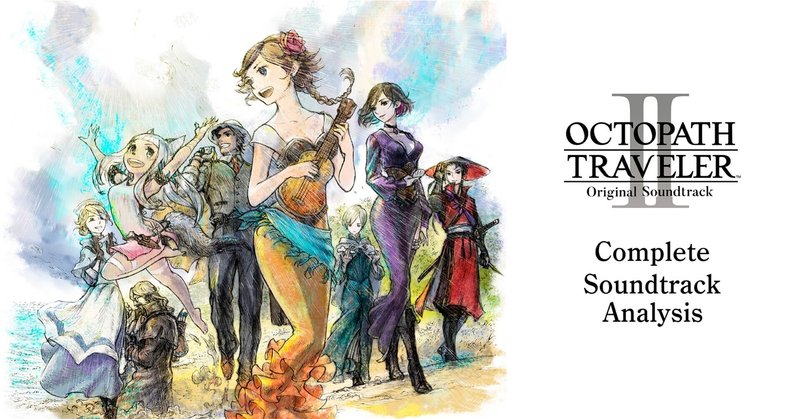
Village in the Ravine/A Verdant Wind Blows
Track 4-15: Village in the Ravine (Day/Night)
This track is this game’s MUJI* piece, haha! Here I was aiming to create a town piece with a bleak, slightly lonely sound, like “Orewell, Beneath the Crags” in OT1.
[* MUJI is a “no-frills” retailer known for a particular aesthetic in regards to its in-store soundtrack.—Ed.]
Regarding the instrument performing the melody, I imagine not many people realized that it was a recorder. We become well acquainted with the recorder in elementary school music classes, but when you’re clearly shown how wonderfully atmospheric it can sound in the hands of a professional, it’s hard to hide your surprise, isn’t it? Haha!
In the night version, the melody is played on acoustic guitar instead, which I think creates a lonely vibe that differs from the recorder in the day version. This is another piece where I hope you’ll enjoy listening for the differences between day and night arrangements.
Track 4-17: A Verdant Wind Blows (Day/Night)
This is my personal favorite town theme in this game. If I were asked my favorite town theme from OT1, I would have answered “Among Stately Peaks,” but in this game “A Verdant Wind Blows” wins hands down.
Due to the influence of the RPG music I encountered in my youth, I’ve long been fond of Celtic music, and that’s part of the reason I like music like this piece, with its boundlessly celebratory feel that seems to scatter joy as it goes. When I received the videos of Wellgrove as advance reference material, I remember deciding that an area this beautiful needed a great theme, and the ideas in this piece came to me after I thought on that for a while.
I said “celebratory,” but precisely because this is my favorite town theme, I also wanted to give it the perfect title, and the phrase “Verdant Wind” conveys that.
It’s only my favorite due to personal preference, so there isn’t much I can introduce in terms of musical technical details, but if pressed I would point out the way the main melody is played on a tin whistle in the day version, but the same phrases are played an octave lower on the low whistle in the night version, creating a different atmosphere. The difference in timbre is part of it, of course, but lowering the range also makes the atmosphere much more serene. It’s simple, but very effective.
Translation: Matt Treyvaud
この記事が気に入ったらサポートをしてみませんか?
